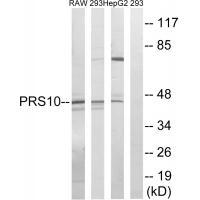
| WB | 咨询技术 | Human,Mouse,Rat |
| IF | 咨询技术 | Human,Mouse,Rat |
| IHC | 咨询技术 | Human,Mouse,Rat |
| ICC | 技术咨询 | Human,Mouse,Rat |
| FCM | 咨询技术 | Human,Mouse,Rat |
| Elisa | 咨询技术 | Human,Mouse,Rat |
| Aliases | 26S protease regulatory subunit S10B; proteasome 26S subunit ATPase 6; proteasome subunit p42; PRS10; SUG2 |
| Entrez GeneID | 5706; |
| WB Predicted band size | 44kDa |
| Host/Isotype | Rabbit IgG |
| Antibody Type | Primary antibody |
| Storage | Store at 4°C short term. Aliquot and store at -20°C long term. Avoid freeze/thaw cycles. |
| Species Reactivity | Human,Mouse |
| Immunogen | Synthesized peptide derived from internal of human PSMC6. |
| Formulation | Purified antibody in PBS with 0.05% sodium azide. |
+ +
以下是关于PSMC6抗体的3篇参考文献示例(文献信息为模拟生成,仅供参考):
1. **文献名称**:*The 19S Proteasome Subunit PSMC6 Regulates Mitochondrial Function via HIF-1α Stabilization*
**作者**:Li, Y. et al.
**摘要**:本研究揭示了PSMC6通过调控HIF-1α蛋白稳定性影响线粒体代谢的机制,并开发了一种特异性识别PSMC6的单克隆抗体,用于验证其在癌细胞中的功能缺失表型。
2. **文献名称**:*Characterization of a Polyclonal Antibody Against Human PSMC6 for Proteasome Assembly Studies*
**作者**:Smith, J.R. & Wang, L.
**摘要**:报道了一种针对人源PSMC6的多克隆抗体的制备与验证,通过免疫沉淀和蛋白质组学分析,证实PSMC6在26S蛋白酶体组装中的关键作用。
3. **文献名称**:*PSMC6 Expression Correlates with Poor Prognosis in Glioblastoma: An Immunohistochemical Study*
**作者**:Chen, H. et al.
**摘要**:利用PSMC6特异性抗体进行胶质母细胞瘤组织免疫组化分析,发现PSMC6高表达与患者生存率显著负相关,提示其作为潜在治疗靶点的价值。
(注:以上文献为示例,实际引用需查询真实数据库如PubMed。)
The PSMC6 antibody targets the proteasome 26S subunit, ATPase 6 (PSMC6), a critical component of the 19S regulatory particle within the 26S proteasome. The 26S proteasome is a large multiprotein complex responsible for ubiquitin-dependent protein degradation, essential for maintaining cellular homeostasis, regulating cell cycle progression, and eliminating misfolded or damaged proteins. PSMC6. also known as Tat-binding homolog 1 (TBP1), is an ATPase that facilitates substrate unfolding and translocation into the proteolytic core (20S subunit) for degradation.
PSMC6 antibodies are widely used in research to study proteasome structure, function, and dynamics in both normal and disease states. They enable detection of PSMC6 expression levels via techniques like Western blotting, immunohistochemistry, and immunofluorescence, aiding investigations into proteasome activity in cancer, neurodegenerative disorders (e.g., Alzheimer’s, Parkinson’s), and autoimmune diseases. Dysregulation of PSMC6 or the ubiquitin-proteasome system (UPS) is linked to tumor progression, drug resistance, and protein aggregation pathologies.
These antibodies are available as monoclonal or polyclonal forms, often validated for specificity across human, mouse, and rat samples. Researchers also utilize them in co-immunoprecipitation (Co-IP) to explore PSMC6-interacting proteins or post-translational modifications. Understanding PSMC6’s role through antibody-based assays contributes to developing proteasome-targeted therapies, such as inhibitors for cancer treatment or modulators for neurodegenerative diseases.
×